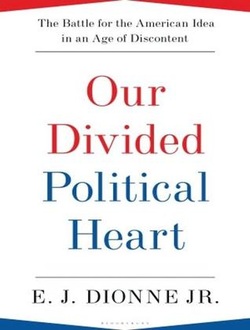
If rational, balanced thought ultimately loses in the marketplace of ideas for America's future, E. J. Dionne's disappointing "Our Divided Political Heart" may serve as an object lesson into why. Dionne confronts the passion and the historical fiction excesses of the Tea Party and recent conservative radicalism with such a cool, emotionally inert equanimity that one's nodding agreement quickly turns into nodding off.
Dionne's central frame -- that we Americans have been struggling with the twin Angels of individuality and community since before our founding -- is not only accurate but is also the font of our unique strength. We have a profound history of moving the pendulum back and forth over the central balance between these two natures, perhaps most concretely in the Hamilton/Jefferson (commercial/agrarian) tug-o-war early in our history. The historical antecedent to the current Tea Party period is not, as they would enshrine, our revolutionary period but rather the 30 year aberration of high-individualism and robber-barons know as the Guilded Age that ended in the early 1900's during the presidency of Republican Teddy Roosevelt.
Dionne's central frame -- that we Americans have been struggling with the twin Angels of individuality and community since before our founding -- is not only accurate but is also the font of our unique strength. We have a profound history of moving the pendulum back and forth over the central balance between these two natures, perhaps most concretely in the Hamilton/Jefferson (commercial/agrarian) tug-o-war early in our history. The historical antecedent to the current Tea Party period is not, as they would enshrine, our revolutionary period but rather the 30 year aberration of high-individualism and robber-barons know as the Guilded Age that ended in the early 1900's during the presidency of Republican Teddy Roosevelt.
It is this struggle for balance which so inflames our present discourse. It must be pointed out, however, that the lines between political philosophies don't so neatly line up. Issues with strong individualistic constructs like marriage equality and reproductive rights are clearly issues of the "left." And issues of community or socialism like farm and sugar subsidies are certainly not anathema by the "right." We see where issues of opportunity -- "grow our base" -- can clearly cross-cut.
Dionne says all the right things, but in such a pedantic and erudite-to-the-point-of-obfuscation manner that the reader is left either to assume that no winning idea would be this obtuse or that community could never match the red meat entertainment of conservatism: "get your governmental hands off my medicare!"
But lest we leave this review with a sense of dread, I'd like to quote the non-Dionne of his time, H. L. Mencken, who observed the balance-seeking nature of the american electorate when they abandoned the Democrats of Wilson to embrace the Republicans of Warren G. Harding in 1920: "tired of the intellectual charlatanry, the electorate turns to honest imbecility."
Dionne says all the right things, but in such a pedantic and erudite-to-the-point-of-obfuscation manner that the reader is left either to assume that no winning idea would be this obtuse or that community could never match the red meat entertainment of conservatism: "get your governmental hands off my medicare!"
But lest we leave this review with a sense of dread, I'd like to quote the non-Dionne of his time, H. L. Mencken, who observed the balance-seeking nature of the american electorate when they abandoned the Democrats of Wilson to embrace the Republicans of Warren G. Harding in 1920: "tired of the intellectual charlatanry, the electorate turns to honest imbecility."
To be tweeted links to my new posts -- blog, book reviews (both nonfiction and fiction), data or other recommended tools -- either go to Twitter.com and follow me @jcrubicon, or just go to my Home page and click on the Twitter button on the right, just above the tweet stream, and follow me @jcrubicon.
 RSS Feed
RSS Feed
